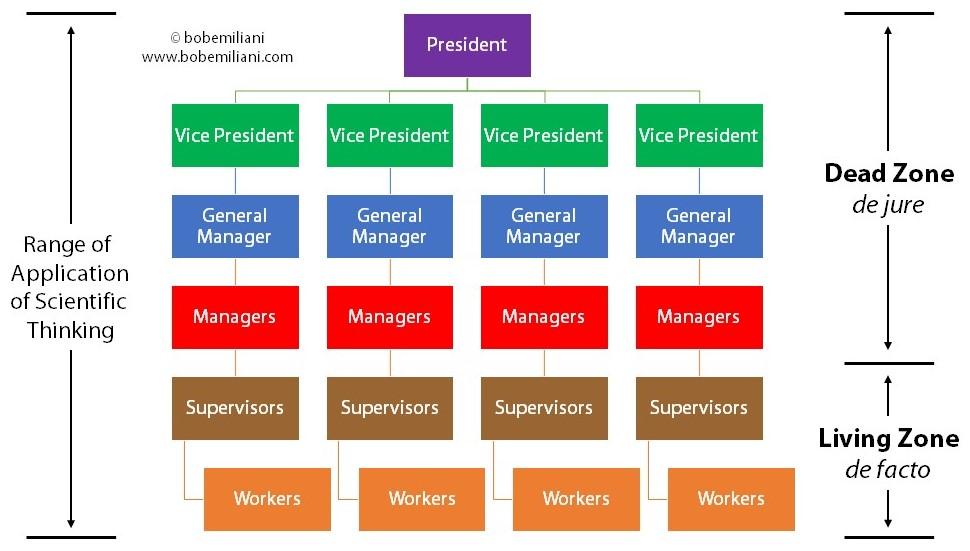Psychological safety has recently become a subject of interest in the Lean community (see here, here, and here). In her book The Fearless Organization, Professor Amy Edmondson defines psychological safety as: “…the belief that the work environment is safe for interpersonal risk taking. The concept refers to the experience of feeling able to speak up with relevant ideas, questions, or concerns” and, more recently, a “sense of felt permission for candor.” The view is that by creating psychological safety for employees, more organizations will create a culture of learning and improvement and therefore successfully undergo a transformation to Lean management. Is this view correct? Is psychological safety needed? Or, is something else needed?
A hallmark of an organization that has transformed from classical management to Lean management is a shift among the executive team from mostly de jure to mostly de facto thinking and decision-making. What do the these Latin terms mean? de jure means the thinking and practices based on rules, customs, habits, sentiments, prejudices, policies, or laws; spiritual, belief-based, magical; and gut instinct — which in business is still highly venerated (see “‘Feel the Force’: Gut Instinct, Not Data, Is the Thing“). de facto means the thinking and practices based on that which exist in reality: facts, cause-and-effect, logical, objective, dispassionate, unbiased; scientific method; the material world. (For more details, see Chapter 3 of The Triumph of Classical Management Over Lean Management, “Metaphysical CEOs and Lean Management”).
Classically managed businesses are managed by leaders in a mostly de jure fashion. You experience this, for example, when you present the facts of a problem to executives, but the decision they make is different or opposite from the facts. Unfortunately, the vast majority of organizations that practice Lean management have not transformed. They remain classically managed businesses at their core. They are Fake Lean, which means that leaders like the tools of continuous improvement, and may demand their use among workers, but they have no interest in “Respect for People.” That means they have no interest in creating psychological safety. Instead, the preferred routines are to hide bad news, blame people for problems arise, and do whatever the boss tells you to do. These routines are more important to senior leaders than learning and improvement among regular employees. Read Irrational Institutions to learn why leaders do things that don’t make sense to workers.
The image below shows the situation. It comes from an earlier blog post titled “Where Scientific Thinking Lives and Dies.” While scientific thinking is applicable to all levels of an organization, it lives only in the lower levels and is largely devoid in the higher levels. That’s because business problems are solved with de jure thinking (e.g. by right; gut instinct) while technical problems are solved with de facto thinking (e.g. the seven QC tools).
Psychological safety is a benefit bestowed by top managers onto workers. Benefits given to workers have costs — perhaps not economic costs, but certainly social, political, and philosophical costs (read The Triumph of Classical Management Over Lean Management to find out why). These are costs that most top leaders are unwilling to bear. Fear is useful to leaders. It quickly conditions employees to fit in, do what the boss says, beat the KPI/metric, and adhere to the plan. They must display loyalty and fealty to their superiors and commit themselves to rapid response to problems or unfavorable metrics, such that their correction benefits the leader. It does not matter if the problem is big or small, infrequent or a daily occurrence. What matters is that workers respond quickly and that they effectively ameliorate the problem by any means. And, of course, the only good idea is the boss’s idea — which typically comes long after others have identified the idea.
If de jure thinking and decision-making are minimized, then there is no need for psychological safety because leaders, accustomed to de facto thinking and decision-making, recognize that many problems exist and that they must be understood and corrected without blaming people. de facto leaders understand that the fundamental nature of business and work is problem-solving and learning, and both are cumulative process that result in ever-more effective capabilities over time when employees are allowed to speak up. de jure leaders have no such understanding. Problems are taken as a personal affront to one’s intelligence, capabilities, and credibility, which expose leaders as weak and ineffective, thus causing them social and political harm within the organization, and a loss of honor.
By design, de jure leaders are hopelessly out of step with the times and unable to respond to rapidly changing business conditions because they are so slow to acknowledge the facts. They retain the belief that power and control are more useful, both personally and organizationally, than facts. In my 1998 paper “Lean Behaviors,” I showed how de jure leaders generate mountains of behavioral waste and block the flow of information, to the detriment of stakeholders: employees, suppliers, customers, and investors.
All organizations struggle to transform from classical management to Lean management. Most fail because leaders have a deeply held belief, based on thousands of years of tradition, that it is more important to retain their prerogatives (privileges) than succumb to facts. The facts are dangerous because they render leaders impotent. Nothing could be worse.
Whether intended or not, Lean management has always been presented to leaders in a way that has made them feel stupid. Instead, try presenting Lean as something that will help relieve them of burdens and the out-dated traditions of leadership.

